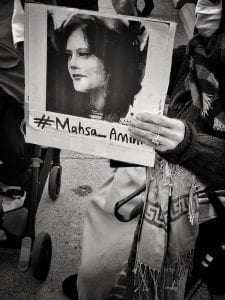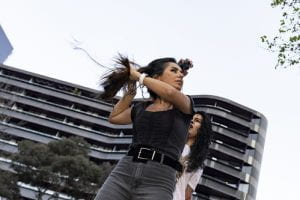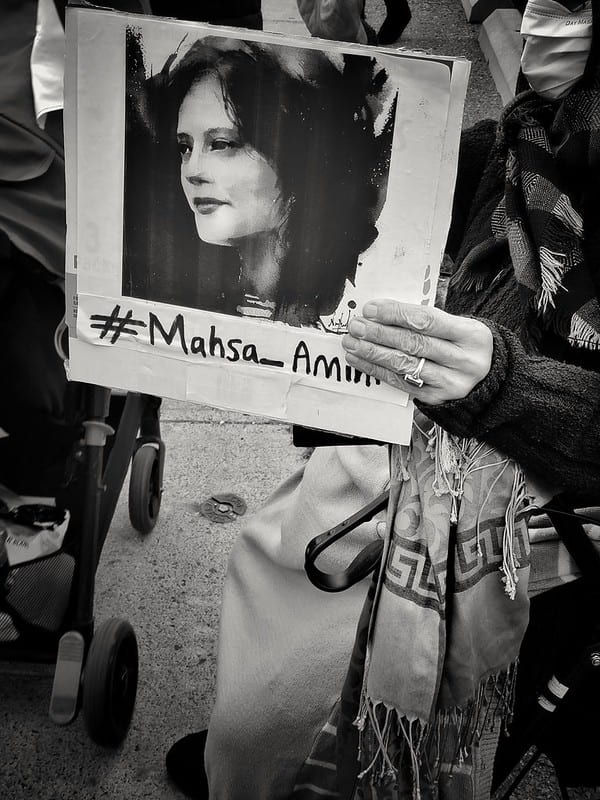Imagine living in a world where a woman showing her hair is considered “immoral” but killing a woman for showing her hair is not. Unfortunately for Mahsa Amini, that is the world we live in. On September 14th 2022, the 22-year-old was visiting the Iranian capital of Tehran with her family when she was arrested by Iran’s police. The reason for her arrest was wearing an “improper” hijab that did not adhere to the strict Islamic dress code laws. While in custody, she was beaten within an inch of her life and was comatose before being pronounced dead the following day. Iranian officials claim she died of a heart attack while in custody.

Public outcry
The Iranian government is implying that a dress code carries more significance than a young woman’s life. However, many Iranians disagree. In fact, women across the country have started publicly removing and burning their hijabs in protest. Burning head scarves is a powerful display that highlights the demand to end mandatory hijab laws. It is a direct objection to the controlling state’s policing of women’s bodies. Many people have taken to the streets to protest this blatant violation of human rights. Article 3 of the UN Declaration of Human Rights states, “Everyone has the right to life, liberty and security of person.” Iranian women’s liberty is in grave danger. Under Iran’s authoritarian regime, personal freedoms and the right to choose are in grave jeopardy. During the protests on September 21, Iran’s armed forces shot and killed more than 8 individuals. In the last 5 days, 15 protestors have died as a result of direct fire from government forces, with an additional 733 people injured and dozens imprisoned.
Morality Police History
Iranian authorities have a long history of violent and inhumane enforcement of dress codes, specifically, compulsory veiling. This can be traced back to the Islamic dress code, a strict dress code that requires women to conceal their hair and neck with a head scarf and to cover their body. This law has been in effect in Iran since 1979, after Iran’s Islamic Revolution. The “Gasht-e-Ershad,” which translates as “guidance patrols”, patrol the streets of Iran enforcing these laws. They arrest individuals they deem in violation of this law, including women who do not adhere to the strict concealment of their body. In 2017, dozens of women removed their hijabs in defiance of the dress code. They waved their white hijabs standing on utility boxes. Since then, the morality police have taken severe measures to prevent women from disobeying the dress code. The arrests often involve verbal abuse and physical violence, targeting women and girls as young as 9 years old. Violent videos have emerged on social media depicting the “morality” agents forcefully detaining women, dragging them by their hair, administering beating with batons, and even spraying them with pepper spray.

Protests Are Not Anti-Islamic
The presence of the morality police is a violation of freedom and dignity of the women in Iran. Western practitioners of Islam may misconceive these acts of protest as an attack on Islam. However, these individuals have the freedom to choose their religion; they are not forced to adhere to religiously influenced governmental action. It is important to make the distinction between burning symbols of the state and disrespecting religion. To many Iranian women, the mandatory hijab enforcement is not a religious symbol, but rather a symbol of their oppression. These protests are the result of religious trauma and not Islamophobia. This movement is not Anti-Islamic, but pro-liberty. Citizens across the nation are fighting against the unjust criminalization of women due to the strict, mandatory dress code. They are fighting against an authoritarian regime that weaponizes Islam as a tool of oppression.
What Can You Do

The courage and solidarity these women are showing is quite moving. This may serve as a catalyst for the liberation of women around the world. As of now, Instagram is blocked in Iran. However, these activists’ valiant efforts will not be stifled. Now the baton passes to us. We must amplify their voices and raise awareness about the atrocities endured by these women by sharing hashtags and saying her name: Mahsa Amini. Follow these informative accounts and repost their posts:
@middleeastmatters
@masih.alineejad
@farnanak_amidi
@golfarahani
@negah_amirii
@duzenetekkal
Use this link to help people in Iran bypass the internet blockade Middle East Matters (mideastmatters.carrd.co). Donate to United for Iran and help fund the app Gershad that alerts woman the whereabouts of the morality police and protects women across Iran from unjust arrest. Everyone is entitled the most basic human right of choice. Women all around the world should be at liberty to wear what they want without fear of jeopardizing their lives.

